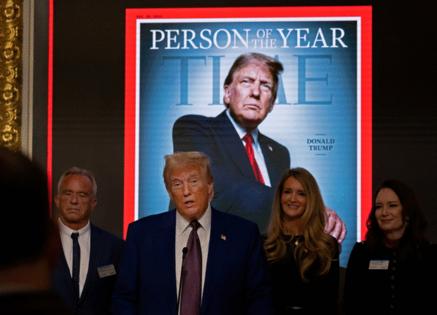Trump keeps world guessing over how he intends to impose tariffs
Published in News & Features
WASHINGTON — President-elect Donald Trump took to Truth Social on Monday to deny a report that he might moderate plans for across-the-board tariffs when he retakes the White House, fanning uncertainty about one of the most hotly anticipated policy moves he’s set to make.
And that may have been the point.
Trump and his team have kept markets, businesses and other nations guessing about how he intends to impose new tariffs, and Monday’s story in the Washington Post added to the questions. Citing people familiar with the matter, the Post reported that his aides were exploring plans to pare back sweeping tariffs. Instead, they’d apply more limited tariffs to all countries but only to critical imports.
Not so fast, Trump said. The story “incorrectly states that my tariff policy will be pared back,” he said. “That is wrong.”
What was right, however, wasn’t so clear. During his campaign, Trump promised 10% to 20% across-the-board tariffs on all imported goods and a tariff as high as 60% on Chinese goods. After he was elected, Trump again shocked markets with a threat to impose additional 10% tariffs on goods from China and 25% on all products from Mexico and Canada.
Whether his team has come up with a plan remains an open question.
But what’s almost certain is that Trump — who sees tariffs as a way to raise revenue, bring about a renaissance in American manufacturing, and make other countries hew to his policy priorities — is gearing up to go ahead with a major package.
Trump is “deeply committed to this,” said Everett Eissenstat, a trade lawyer who held key positions in Trump’s first administration and as an adviser to Congress. “There’s been a couple of comments via social media over the last several weeks that reiterated that tariffs are a central plank of his economic policy. And it doesn’t just appear to be for transactional purposes.”
“Tariffs can have multiple purposes and it seems that he’s still wedded to multiple purposes,” Eissenstat said. “This just reconfirms the point that if you want know what the president’s going to do, you have to ask the president.”
In the past 24 hours, Trump has said that Congress will use revenue from tariffs to help pay for extending his 2017 tax cuts in a “powerful” bill that would eliminate taxes on tips. He also said tariffs would help revitalize United States Steel Corp. President Joe Biden last week blocked a deal between the company and Nippon Steel Corp. that would have seen the Japanese company purchase the iconic but struggling firm.
“Why would they want to sell U.S. Steel now when Tariffs will make it a much more profitable and valuable company?” Trump mused on Truth Social.
That Trump would take such an attitude is no surprise. It was Trump, after all, who told Bloomberg News Editor in Chief John Micklethwait in an interview in October that “the most beautiful word in the dictionary is ‘tariff.’”
Asked for comment on the president-elect’s latest plans, a transition spokesperson pointed to Trump’s post on Truth Social.
The last, best hope for free traders is whether Trump will actually be able to carry out his tariff threats. The daunting challenge of imposing a major tariff package may be one reason Trump’s advisers might be considering other options, despite what the president-elect says on social media.
Trump’s tariff plans could come under legal challenges, as they did in his first term, and Congress could balk at using revenue from tariffs to pay for tax cuts. Some members — including die-hard free trade Republicans — may oppose using them at all, especially if they go beyond a certain threshold.
There is also the risk that tariffs could spike inflation and reduce U.S. GDP. A Bloomberg Economics study found that U.S. GDP might be 0.8% lower by 2028 if only China retaliates and 1.3% lower if other countries also increase tariffs on U.S. goods. Higher tariffs would also push up prices on imported goods, potentially leading to an increase in inflation, according to Maeva Cousin and Eleonora Mavroeidi.
But that’s not necessarily a reason to shy away from using them, according to some defenders of Trump’s economic plans.
“Tariffs will definitely have some effect on prices, especially in the short run,” Oren Cass, the founder and chief economist at American Compass, said on PBS in November. “That’s in part the point, to make it more attractive to buy things in America.”
_____
©2025 Bloomberg L.P. Visit bloomberg.com. Distributed by Tribune Content Agency, LLC.







Comments